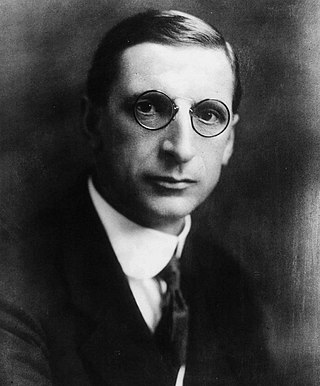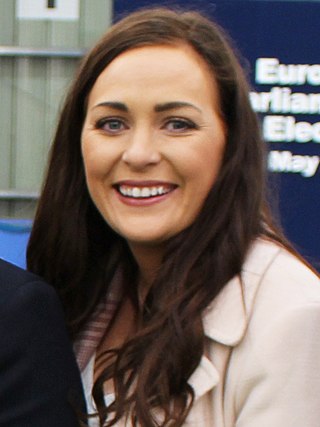Related Research Articles

The Irish component of the 1918 United Kingdom general election took place on 14 December 1918. It was the final United Kingdom general election to be held throughout Ireland, as the next election would happen following Irish independence. It is a key moment in modern Irish history, seeing the overwhelming defeat of the moderate nationalist Irish Parliamentary Party (IPP), which had dominated the Irish political landscape since the 1880s, and a landslide victory for the radical Sinn Féin party. Sinn Féin had never previously stood in a general election, but had won six seats in by-elections in 1917–1918. The party had vowed in its manifesto to establish an independent Irish Republic. In Ulster, however, the Unionist Party was the most successful party.

Michelle Angela Gildernew is an Irish Sinn Féin politician from County Tyrone, Northern Ireland. She was the Member of Parliament (MP) for Fermanagh and South Tyrone from 2017 to 2024, after previously holding the seat from 2001 to 2015.

Mid Ulster is a parliamentary constituency in the UK House of Commons. The current MP is Cathal Mallaghan, of Sinn Féin, who was first elected at the 2024 election.
There were two elections in Ireland on 24 May 1921, following the establishment of the House of Commons of Northern Ireland and the House of Commons of Southern Ireland under the Government of Ireland Act 1920. New constituencies were established for both parliaments. A resolution of Dáil Éireann on 10 May 1921 held that these elections were to be regarded as elections to Dáil Éireann and that all those returned at these elections be regarded as members of Dáil Éireann. According to this theory of Irish republicanism, these elections provided the membership of the Second Dáil. The Second Dáil lasted 297 days.

The 2007 Northern Ireland Assembly election was held on Wednesday, 7 March 2007. It was the third election to take place since the devolved assembly was established in 1998. The election saw endorsement of the St Andrews Agreement and the two largest parties, the Democratic Unionist Party (DUP) and Sinn Féin, along with the Alliance Party, increase their support, with falls in support for the Ulster Unionist Party (UUP) and the Social Democratic and Labour Party (SDLP).

The 1986 Northern Ireland by-elections were fifteen by-elections held on 23 January 1986, to fill vacancies in the Parliament of the United Kingdom caused by the resignation in December 1985 of all sitting Unionist Members of Parliament (MPs). The MPs, from the Ulster Unionist Party, Democratic Unionist Party and Ulster Popular Unionist Party, did this to highlight their opposition to the Anglo-Irish Agreement, signed the month before.

Francis Joseph Molloy is an Irish Sinn Féin politician who was the abstentionist Member of Parliament (MP) for Mid Ulster from 2013 to 2024. He was a Member of the Northern Ireland Assembly (MLA) for Mid Ulster from 1998 to 2013.

The 2011 Northern Ireland Assembly election took place on Thursday, 5 May, following the dissolution of the Northern Ireland Assembly at midnight on 24 March 2011. It was the fourth election to take place since the devolved assembly was established in 1998.

The 2016 Northern Ireland Assembly election was held on Thursday, 5 May 2016. It was the fifth election to take place since the devolved assembly was established in 1998. 1,281,595 individuals were registered to vote in the election. Turnout in the 2016 Assembly election was 703,744 (54.9%), a decline of less than one percentage point from the previous Assembly Election in 2011, but down 15 percentage points from the first election to the Assembly held in 1998.
The fourth Northern Ireland Assembly was the unicameral devolved legislature of Northern Ireland following the 2011 assembly election on 5 May 2011. This iteration of the elected Assembly convened for the first time on 12 May 2011 in Parliament Buildings in Stormont, and ran for a full term.

The 2010 United Kingdom general election in Northern Ireland occurred on 6 May 2010 and all 18 seats in Northern Ireland were contested. 1,169,184 people were eligible to vote, up 29,191 from the 2005 general election. 57.99% of eligible voters turned out, down 5.5 percentage points from the last general election.

The 2005 United Kingdom general election in Northern Ireland was held on 5 May 2005 and all 18 seats in Northern Ireland were contested. 1,139,993 people were eligible to vote, down 51,016 from the 2001 general election. 63.49% of eligible voters turned out, down 5.1 percentage points from the last general election.
The Ulster Unionist Party held the majority of Northern Ireland seats in most elections for the Westminster Parliament between 1922 and 2001. Since then its representation has been low or non-existent, having been eclipsed by the Democratic Unionist Party. It always had an absolute majority in the Stormont Parliament (1921–1972); since that Parliament was replaced by the Northern Ireland Assembly it has had a substantial minority representation there. Its share of the vote in Northern Ireland local government elections has tended to diminish, so that there too it is no longer the largest party. Finally, the party has always held one of the three Northern Ireland seats in the European Parliament. Its share of the Northern Ireland vote in the most recent elections to these bodies has been between 10.5% and 16.1%.

The 2015 United Kingdom general election in Northern Ireland was held on 7 May 2015 and all 18 seats were contested. 1,236,765 people were eligible to vote, up 67,581 from the 2010 general election. 58.45% of eligible voters turned out, an increase of half a percentage point from the last general election. This election saw the return of Ulster Unionists to the House of Commons, after they targeted 4 seats but secured 2.

A by-election was held in the UK Parliament constituency of West Tyrone on 3 May 2018, following the resignation of Barry McElduff, who had been the Member of Parliament (MP) since 2017. McElduff had become embroiled in a social media controversy which had resulted in his suspension from Sinn Féin on 8 January. He announced his resignation on 15 January 2018.

Órfhlaith Acife Begley is a Sinn Féin politician from Northern Ireland. She is Member of Parliament (MP) for West Tyrone, having first won the seat in a by-election on 3 May 2018. Prior to her political career, Begley was a solicitor.

The 2019 United Kingdom general election was held on 12 December 2019 to elect all 650 members of the House of Commons, including 18 seats in Northern Ireland. 1,293,971 people were eligible to vote, up 51,273 from the 2017 general election. 62.09% of eligible voters turned out, down 3.5 percentage points from the last general election. For the first time in history, nationalist parties won more seats than unionist parties.
References
- ↑ "Órfhlaith Begley profile: Who is the new West Tyrone MP?". BBC News. 4 May 2018. Retrieved 17 May 2022.